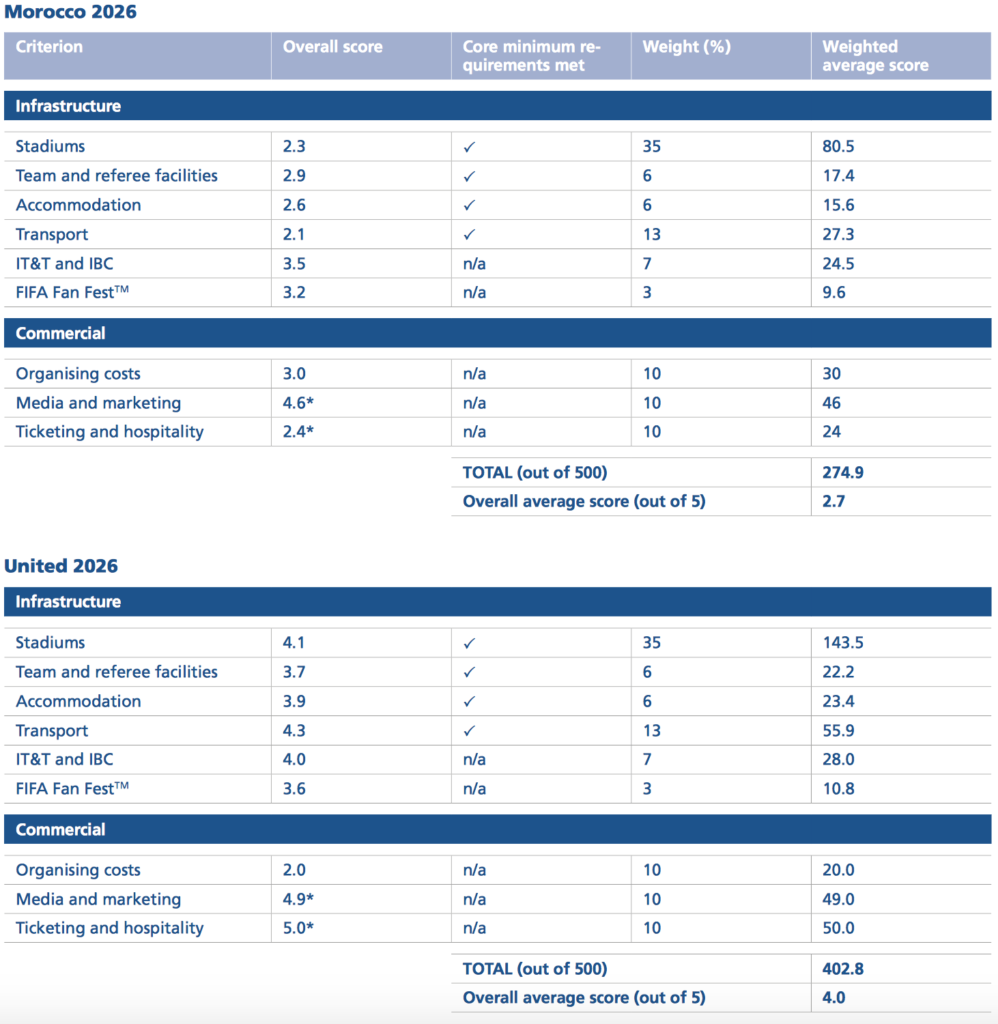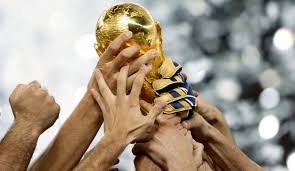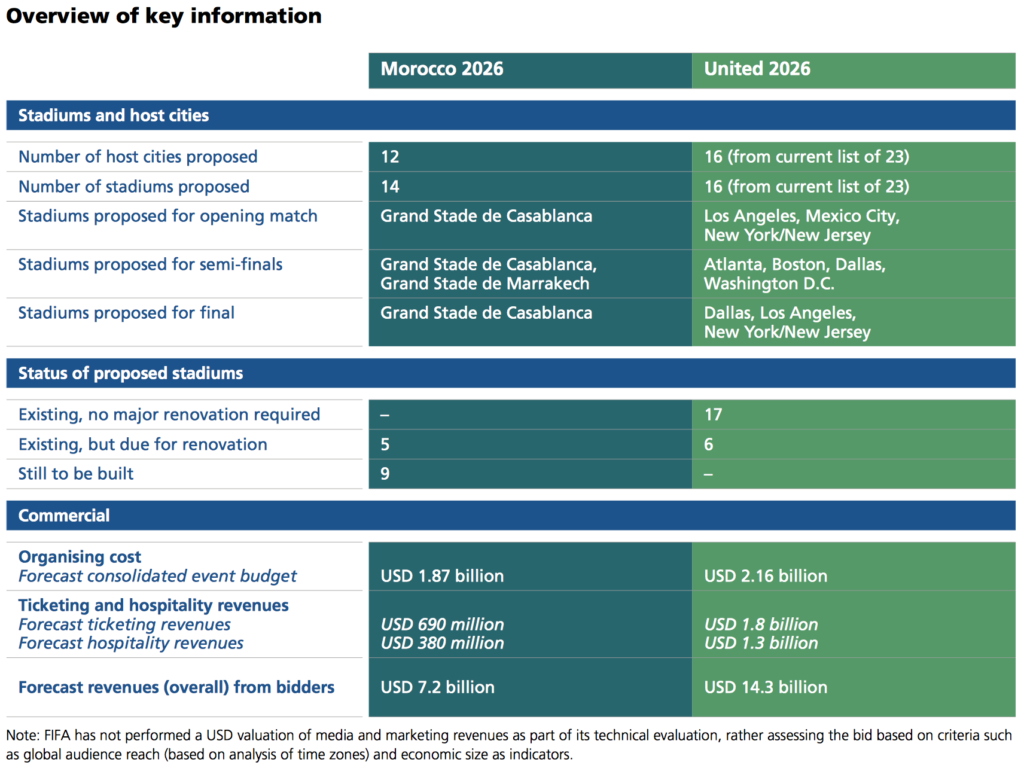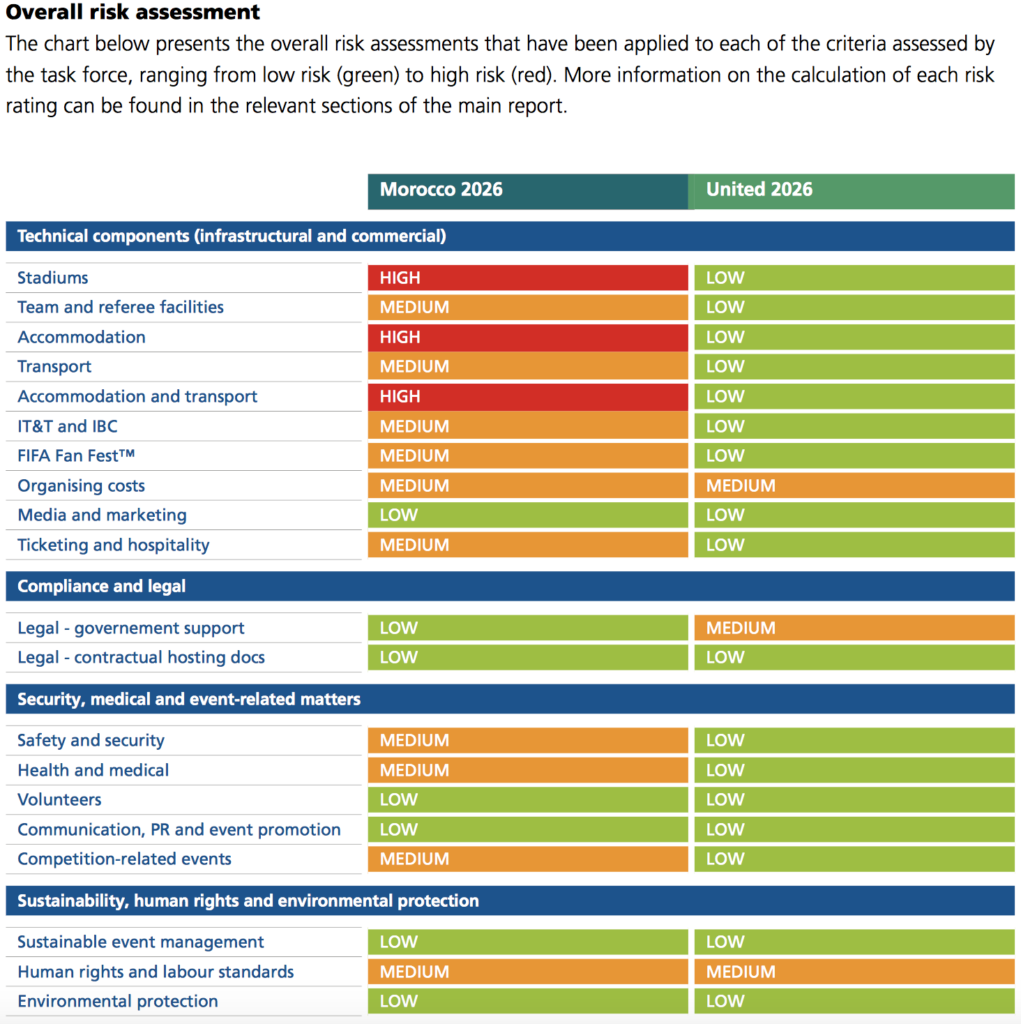By Andrew Warshaw
June 2 – Publicly, they have put on a brave face and sent out a positive message. Privately, as well as being relieved, they must be mightily frustrated to put it mildly.
Morocco’s bid to host the 2026 World Cup has officially passed the all-important FIFA inspection test but the knock-on effect of being rated way behind the heavyweight North American favourites cannot be over-estimated.
For months, Moroccan officials have questioned both the make-up and the motives of the five-man evaluation team, none of whose members are independent and all of whom are close to FIFA president Gianni Infantino.
Fears that Morocco might be disqualified from the process before the ballot even takes place have receded in recent weeks but that won’t stop bid team officials pointing to perceived preferential treatment being given to the north Americans after the Moroccan bid was deemed “high risk” in three key areas.
By contrast, United 2026 had no high risk areas and were handed a 4.0 rating out 5.0 compared with the Moroccans’ 2.7 (see chart).
FIFA could have disqualified Morocco had their overall rating been less than two. That was unlikely to happen but the 224-page report pulls no punches when it comes to who is better equipped to stage the first World Cup comprising 48 teams.
“The amount of new infrastructure required for the Morocco 2026 bid to become reality cannot be overstated,” the report bluntly states.
Although inspection scores can be ignored, the report’s verdict will put significant pressure on FIFA’s voting members to follow the findings from the inspectors, not least in order to avoid a repeat of the last World Cup vote when Qatar were rated bottom of the pack but emerged victorious, leading to the mother of all scandals.
In a diplomatically-worded statement that offered no response to being placed so far behind, Morocco were careful not to criticise the inspection team but simply to play up their own credentials following four bitter failures in the past.
Moulay Hafid Elalamy, President of Morocco 2026 Bid Committee, said the whole country was “excited to qualify for this next stage of the process and be declared fit to organise the FIFA World Cup.
“We will now continue to present to voters our vision for Morocco 2026, and will aim to convince the majority of Member Associations to vote for our nation at FIFA Congress on June 13,” he said. “In the coming days, we will continue our mission to demonstrate to FIFA and the entire football family, our ability to deliver a highly profitable and truly authentic FIFA World Cup – one that will leave a lasting legacy for the world of football.
Fouzi Lekjaa, president of the Royal Moroccan Football Federation (FRMF), was slightly less guarded, however, saying FIFA federations had a choice “to show the world that it triumphs the values of sport above all else.”
The three areas where Morocco were marked high risk were on proposals for stadiums, accommodation and transport. No-one would argue with that on current levels of infrastructure but supporters of Morocco make the point they should not be judged on whether they are as organisationally strong as north America today but what their capabilities might be in eight years’ time. The Americans make a similar point about the politics of the day when it comes to anti-Trump sentiment.
Commercially it was always likely that United 2026 would impress the inspectors who highlighted their forecast revenue for the tournament of $14.3 billion as “significantly higher” than Morocco’s $7.2 billion.
The only areas where the north Americans were questioned were on government support, human rights and labour standards and organising costs. But these received a perfectly acceptable medium risk rating.
The Moroccans will be particularly irritated at their compactness and footballing passion, two of their biggest selling points, seemingly being ignored especially since the Americans have held the World Cup once and Mexico twice. While United 2026 represents an entire continent, and more, throughout the process Morocco’s campaign team has highlighted their limited travel times and distances between matches.
Then there is the political factor. United 2026 has made a point of stressing that the ballot should be all about football criteria rather than politics. That has somewhat bemused the underdogs, not least in the wake of Donald Trump’s notorious tweet hinting of possible repercussions against countries who vote against America.
“It makes me laugh when people talk about this being a vote based on football rather than politics,” said a source close to the bid process.
What is clear is that Morocco now face a race against time to hammer home their message among FIFA’s 207 eligible voting members in order to try and reach the magic number of 104. They will no doubt be further targeting European and Asian nations, with the possibility of some of kind of deal-making behind the scenes before the public vote during the FIFA Congress in Moscow.
Perhaps most alarmingly of all for the Moroccans, however, is one specific clause in the report’s executive summary that sums up the Task Force’s thinking. The respective bids, it says, are “almost opposite ends of the spectrum.”
That in itself could be enough to win the day for the favourites.

Contact the writer of this story at moc.l1741605915labto1741605915ofdlr1741605915owedi1741605915sni@w1741605915ahsra1741605915w.wer1741605915dna1741605915



